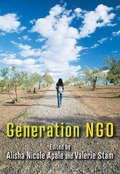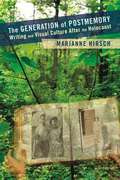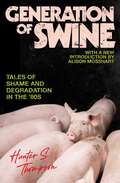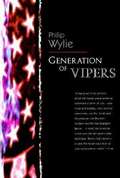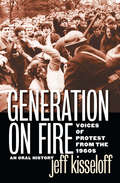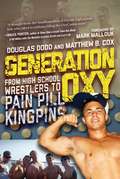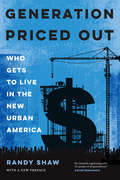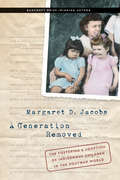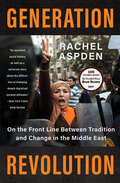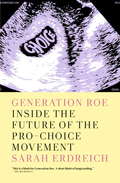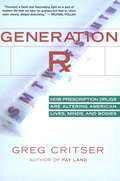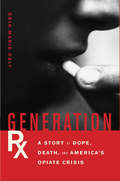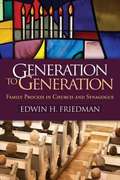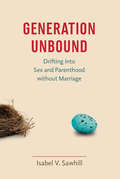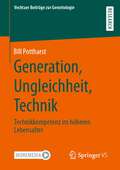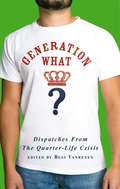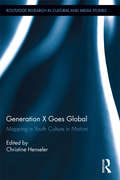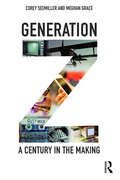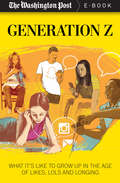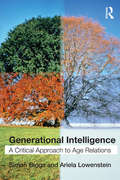- Table View
- List View
Generation NGO
by Apale, Alisha Nicole & Stam, ValerieYoung Canadians are increasingly active and engaged in global issues. Many are eagerly poised to contribute–in smaller and even larger ways–to international development and the Canadian national politics that, for better or worse, shape the field. Generation NGO captures some of the first impressions of these young international development professionals before they are relegated to the dusty corners of memory. It provides snapshots of some of their first experiences with inequality and poverty, power and privilege, stereotypes, identity, social location, prejudice, and injustice. It is as much about questions as it is about answers. These essays illustrate the continual negotiation of development workers in positioning and conducting themselves in a morally and ethically charged profession. A must-read collection for Canadians contemplating development work abroad, this collection will also provide food for thought for more seasoned veterans of NGO forays long after they have returned from the field.
The Generation of Postmemory: Writing and Visual Culture After the Holocaust (Gender and Culture Series)
by Marianne HirschCan we remember other people's memories? The Generation of Postmemory argues we can: that memories of traumatic events live on to mark the lives of those who were not there to experience them. Children of survivors and their contemporaries inherit catastrophic histories not through direct recollection but through haunting postmemories-multiply mediated images, objects, stories, behaviors, and affects passed down within the family and the culture at large. In these new and revised critical readings of the literary and visual legacies of the Holocaust and other, related sites of memory, Marianne Hirsch builds on her influential concept of postmemory. The book's chapters, two of which were written collaboratively with the historian Leo Spitzer, engage the work of postgeneration artists and writers such as Art Spiegelman, W.G. Sebald, Eva Hoffman, Tatana Kellner, Muriel Hasbun, Anne Karpff, Lily Brett, Lorie Novak, David Levinthal, Nancy Spero and Susan Meiselas. Grappling with the ethics of empathy and identification, these artists attempt to forge a creative postmemorial aesthetic that reanimates the past without appropriating it. In her analyses of their fractured texts, Hirsch locates the roots of the familial and affiliative practices of postmemory in feminism and other movements for social change. Using feminist critical strategies to connect past and present, words and images, and memory and gender, she brings the entangled strands of disparate traumatic histories into more intimate contact. With more than fifty illustrations, her text enables a multifaceted encounter with foundational and cutting edge theories in memory, trauma, gender, and visual culture, eliciting a new understanding of history and our place in it.
Generation of Swine: The Brutal Odyssey of an Outlaw Journalist
by Hunter S. ThompsonFrom the bestselling author of Fear and Loathing in Las Vegas, the legendary Hunter S. Thompson's second volume of the "Gonzo Papers" is back. Generation of Swine collects hundreds of columns from the infamous journalist's 1980s tenure at the San Francisco Examiner.Here, against a backdrop of late-night tattoo sessions and soldier-of-fortune trade shows, Dr. Thompson is at his apocalyptic best--covering emblematic events such as the 1987-88 presidential campaign, with Vice President George Bush, Sr., fighting for his life against Republican competitors like Alexander Haig, Pat Buchanan, and Pat Robertson; detailing the GOP's obsession with drugs and drug abuse; while at the same time capturing momentous social phenomena as they occurred, like the rise of cable, satellite TV, and CNN--24 hours of mainline news. Showcasing his inimitable talent for social and political analysis, Generation of Swine is vintage Thompson--eerily prescient, incisive, and enduring.
Generation of Swine
by Hunter S. ThompsonGeneration of Swine, the second volume of the legendary Dr. Hunter S. Thompson's bestselling "Gonzo Papers," was first published in 1988 and is now back in print. Here, against a backdrop of late-night tattoo sessions and soldier-of-fortune trade shows, Dr. Thompson is at his apocalyptic best -- covering emblematic events such as the 1987-88 presidential campaign, with Vice President George Bush, Sr., fighting for his life against Republican competitors like Alexander Haig, Pat Buchanan, and Pat Robertson; detailing the GOP's obsession with drugs and drug abuse; while at the same time capturing momentous social phenomena as they occurred, like the rise of cable, satellite TV, and CNN -- 24 hours of mainline news. Showcasing his inimitable talent for social and political analysis, Generation of Swine is vintage Thompson -- eerily prescient, incisive, and enduring.
Generation of Vipers (War Edition)
by Philip Wylie"Perhaps the most vitriolic attack ever launched on the American way of living - from politicians to professors to businessmen to Mom to sexual mores to religion - Generation of Vipers ranks with the works of De Tocqueville and Emerson in defining the American character and malaise. Wylie's classic, written with devastating wit and a pen as sharp as a barber's razor, wages war on all forms of American hypocrisy. Remarkably, or perhaps not so, what Philip Wylie has to say rings as true today as when he first wrote Vipers, and no doubt it will continue to offend and outrage both the Left and Right. Harsh, bitter, and filled with venom toward those who have corrupted the America that "could have been," Generation of Vipers will be read with pleasure and indignation a century from now. "--BOOK JACKET. Title Summary field provided by Blackwell North America, Inc. All Rights Reserved
Generation on Fire: Voices of Protest from the 1960s, an Oral History
by Jeff Kisseloff&“An invigorating collection of fifteen testimonials from counter-culturists, conscientious objectors, and artists who came of age&” during the &’60s (Publishers Weekly). Many of the freedoms and rights Americans enjoy today are the direct result of those who defied the established order during the Civil Rights Era. It was an era that challenged both mainstream and elite American notions of how politics and society should function. In Generation on Fire, oral historian Jeff Kisseloff provides an eclectic and personal account of the political and social activity of the decade. Among other things, the book offers firsthand accounts of what it was like to face a mob's wrath in the segregated South and to survive the jungles of Vietnam. It takes readers inside the courtroom of the Chicago Eight and into a communal household in Vermont. From the stage at Woodstock to the playing fields of the NFL and finally to a fateful confrontation at Kent State, Generation on Fire brings the '60s alive again. This collection of never-before published interviews illuminates the ingrained social and cultural obstacles facing those working for change as well as the courage and shortcomings of those who defied "acceptable" conventions and mores. Sometimes tragic, sometimes hilarious, the stories in this volume celebrate the passion, courage, and independent thinking that led a generation to believe change for the better was possible.
Generation Oxy: From High School Wrestlers to Pain Pill Kingpins
by Douglas Dodd Matthew CoxGeneration Oxy is the story of a group of friends—clean cut, all-American high school kids—who stumbled into the Sunshine State’s murky underworld of illegal pill mills and corrupt doctors. This teenage criminal enterprise ultimately shipped hundreds of thousands of OxyContins and other prescription painkillers throughout the country, making millions in the process.This true crime memoir details the three-year-long rise and collapse of the Barabas Criminal Enterprise, an opiod-pill trafficking ring founded by Douglas Dodd and his best friend on the wrestling team, Lance Barabas. Raised by an alcoholic mother and surrounded by drug-abusing relatives, Dodd got involved in narcotics at an early age. Their scheme to sell the drugs he was already consuming coincided with the explosion of prescription addicts who were traveling the “Oxy Express” to Florida for easy access to the pills they dubbed “hillbilly heroin.” Soon they were shipping forty thousand pills a month, with tens of thousands of dollars returning in hollowed-out teddy bears.In Generation Oxy, Dodd recounts his time as a wannabe Scarface: bottle-service at clubs, an arsenal of weapons that would make Dillinger blush, narrow escapes from the law, hordes of young women, and as many pills as he could swallow. And this was all before he was legally able to drink a beer, while still living with his grandmother. The good times came to an end when the DEA closed in and the twenty-year-old Dodd faced life in federal prison.
Generation Priced Out: Who Gets to Live in the New Urban America, with a New Preface
by Randy ShawGeneration Priced Out is a call to action on one of the most talked-about issues of our time: how skyrocketing rents and home values are pricing the working and middle classes out of urban America. Randy Shaw tells the powerful stories of tenants, politicians, homeowner groups, developers, and activists in over a dozen cities impacted by the national housing crisis. From San Francisco to New York, Seattle to Denver, and Los Angeles to Austin, Generation Priced Out challenges progressive cities to reverse rising economic and racial inequality. Shaw exposes how boomer homeowners restrict millennials’ access to housing in big cities, a generational divide that increasingly dominates city politics. Shaw also demonstrates that neighborhood gentrification is not inevitable and presents proven measures for cities to preserve and expand their working- and middle-class populations and achieve more equitable and inclusive outcomes. Generation Priced Out is a must-read for anyone concerned about the future of urban America.
A Generation Removed: The Fostering and Adoption of Indigenous Children in the Postwar World
by Margaret D. JacobsOn June 25, 2013, the U.S. Supreme Court heard the case Adoptive Couple vs. Baby Girl, which pitted adoptive parents Matt and Melanie Capobianco against baby Veronica’s biological father, Dusten Brown, a citizen of the Cherokee Nation of Oklahoma. Veronica’s biological mother had relinquished her for adoption to the Capobiancos without Brown’s consent. Although Brown regained custody of his daughter using the Indian Child Welfare Act (ICWA) of 1978, the Supreme Court ruled in favor of the Capobiancos, rejecting the purpose of the ICWA and ignoring the long history of removing Indigenous children from their families. In A Generation Removed, a powerful blend of history and family stories, award-winning historian Margaret D. Jacobs examines how government authorities in the post–World War II era removed thousands of American Indian children from their families and placed them in non-Indian foster or adoptive families. By the late 1960s an estimated 25 to 35 percent of Indian children had been separated from their families. Jacobs also reveals the global dimensions of the phenomenon: These practices undermined Indigenous families and their communities in Canada and Australia as well. Jacobs recounts both the trauma and resilience of Indigenous families as they struggled to reclaim the care of their children, leading to the ICWA in the United States and to national investigations, landmark apologies, and redress in Australia and Canada.
Generation Revolution: On the Front Line Between Tradition and Change in the Middle East
by Rachel AspdenGeneration Revolution unravels the complex forces shaping the lives of four young Egyptians on the eve and in the aftermath of the Arab Spring, and what their stories mean for the future of the Middle East.In 2003 Rachel Aspden arrived in Egypt as a 23-year-old journalist. She found a country on the brink of change. The two-thirds of Egypt’s eight million citizens under the age of 30 were stifled, broken, and frustrated, caught between a dictatorship that had nothing to offer them and their autocratic parents’ generation, defined by tradition and obedience. In January 2011 the young people’s patience ran out. They thought the revolution that followed would change everything. But as violence escalated, the economy collapsed, and as the united front against President Mubarak shattered into sectarianism, many found themselves at a loss. Following the stories of four young Egyptians — Amr, the atheist software engineer; Amal, the village girl who defied her family and her entire community; Ayman, the one-time religious extremist; and Ruqayah, the would-be teenage martyr — Generation Revolution exposes the failures of the Arab Spring and shines new light on those left in the wake of its lost promise.
Generation Roe: Inside the Future of the Pro-Choice Movement
by Sarah ErdreichStrong support among women was key to Obama's reelection. At the start of his second term, it is time for Barack Obama, forty years after Roe v. Wade, to finally help lead us to demystify abortion. One-third of all American women will have an abortion by the time they are 45, and most of those women are already mothers. Yet, the topic remains taboo. In this provocative book on the heels of the Planned Parenthood controversy, Sarah Erdreich presents the antidote to the usual abortion debates. Inextricably connected to issues of autonomy, privacy, and sexuality, the abortion debate remains home base for the culture wars in America. Yet, there is more common ground than meets the eye in favor of choice. Generation Roe delves into phenomena such as "abortion-recovery counseling," "crisis pregnancy centers," and the infamous anti-choice "black children are an endangered species" billboards. It tells the stories of those who risk their lives to pursue careers in this stigmatized field. And it outlines the outrageous legislative battles that are being waged against abortion rights all over the country. With an inspiring spirit and a forward-looking approach, Erdreich holds abortion up, unabashedly, as a moral and fundamental human right.
Generation Rx: How Prescription Drugs Are Altering American Lives, Minds, and Bodies
by Greg CritserThis in-depth look at the rise of Big Pharma and pill marketing is &“a page-turner&” (Booklist, starred review). A finalist for a PEN America Literary Award for Research Nonfiction, this book takes a deep look at how the pharmaceutical industry—with some help from the medical and insurance fields and from American consumers themselves—has pushed its products, often at the expense of our health. Generation Rx reveals the roots of many of the widespread societal problems we face today, explaining how marketing efforts changed powerful chemical compounds for chronic diseases, once controlled by physicians, into substances we feel entitled to, whether we need them or not. Using exclusive interviews with the strategists, scientists, and current and former heads of GlaxoSmithKline, Eli Lilly, Merck, Roche, and more, the author of Fat Land presents a &“fascinating and disturbing&” story of business interests unleashed on an unsuspecting public, and a cultural shift that has caused lasting—and sometimes lethal—damage (New Scientist). &“What Fast Food Nation did for the way Americans eat, Greg Critser does for the way we medicate ourselves.&” —Michael Pollan, bestselling author of The Omnivore&’s Dilemma
Generation Rx: A Story of Dope, Death, and America's Opiate Crisis
by Erin Marie DalyThese are the harrowing questions that plagued Erin Marie Daly after her youngest brother Pat, an OxyContin addict, was found dead of a heroin overdose at the age of twenty. In just a few short years, the powerful prescription painkiller had transformed him from a fun-loving ball of energy to a heroin addict so hell-bent on getting his next fix that he was willing to lie, steal, and hurt everyone he loved. Yet even as Pat's addiction destroyed his external life, his internal struggle with opiates was far more heart wrenching. Erin set out on a painful personal journey to learn what had really happened to her little brother; as a journalist, she was startled to discover a new twist to the ongoing prescription drug epidemic. That kids are hooked on prescription drugs is nothing new; what is new is the rising number of young heroin junkies whose addiction began with pills in suburban bedrooms, and how a generation of young people playing around with today's increasingly powerful opioids are finding themselves in the frightening grip of heroin.While many books have tackled the topic of Big Pharma, drug addiction, and our increasingly over-medicated society, Generation Rx offers an entirely new look at what the prescription pill epidemic means for today's youth, and the world around them.
Generation to Generation
by Mickie Crimone Edwin H. Friedman Gary EmanuelAn acclaimed, influential work now available in paper for the first time, this bestselling book applies the concepts of systemic family therapy to the emotional life of congregations. Edwin H. Friedman shows how the same understanding of family process that can aid clergy in their pastoral role also has important ramifications for negotiating congregational dynamics and functioning as an effective leader. Clergy from diverse denominations, as well as family therapists and counselors, have found that this book directly addresses the dilemmas and crises they encounter daily. It is widely used as a text in courses on family systems and pastoral care.
Generation to Generation
by Edwin H. Friedman Mickie Crimone Gary EmanuelAn acclaimed, influential work now available in paper for the first time, this bestselling book applies the concepts of systemic family therapy to the emotional life of congregations. Edwin H. Friedman shows how the same understanding of family process that can aid clergy in their pastoral role also has important ramifications for negotiating congregational dynamics and functioning as an effective leader. Clergy from diverse denominations, as well as family therapists and counselors, have found that this book directly addresses the dilemmas and crises they encounter daily. It is widely used as a text in courses on family systems and pastoral care.
Generation to Generation
by Edwin H. Friedman Mickie Crimone Gary EmanuelAn acclaimed, influential work now available in paper for the first time, this bestselling book applies the concepts of systemic family therapy to the emotional life of congregations. Edwin H. Friedman shows how the same understanding of family process that can aid clergy in their pastoral role also has important ramifications for negotiating congregational dynamics and functioning as an effective leader. Clergy from diverse denominations, as well as family therapists and counselors, have found that this book directly addresses the dilemmas and crises they encounter daily. It is widely used as a text in courses on family systems and pastoral care.
Generation to Generation
by Biff Rocha Edwin FriedmanAn acclaimed, influential work now available in paper for the first time, this bestselling book applies the concepts of systemic family therapy to the emotional life of congregations. Edwin H. Friedman shows how the same understanding of family process that can aid clergy in their pastoral role also has important ramifications for negotiating congregational dynamics and functioning as an effective leader. Clergy from diverse denominations, as well as family therapists and counselors, have found that this book directly addresses the dilemmas and crises they encounter daily. It is widely used as a text in courses on pastoral care, leadership, and family systems.
Generation Unbound
by Isabel V. SawhillOver half of all births to young adults in the United States now occur outside of marriage, and many are unplanned. The result is increased poverty and inequality for children. The left argues for more social support for unmarried parents; the right argues for a return to traditional marriage.In Generation Unbound, Isabel V. Sawhill offers a third approach: change "drifters" into "planners." In a well-written and accessible survey of the impact of family structure on child well-being, Sawhill contrasts "planners," who are delaying parenthood until after they marry, with "drifters," who are having unplanned children early and outside of marriage. These two distinct patterns are contributing to an emerging class divide and threatening social mobility in the United States.Sawhill draws on insights from the new field of behavioral economics, showing that it is possible, by changing the default, to move from a culture that accepts a high number of unplanned pregnancies to a culture in which adults only have children when they are ready to be a parent.
Generation Unbound: Drifting into Sex and Parenthood without Marriage
by Isabel V. SawhillOver half of all births to young adults in the United States now occur outside of marriage. A large proportion are unplanned. These facts suggest that today's young adults are drifting into relationships and are often unprepared for parenthood. What kind of future does this mean for their kids and for society as a whole? In Generation Unbound, Isabel V. Sawhill discusses likely causes for recent changes in the family, such as an increase in women's economic opportunities, the declining economic prospects of men, greater access to birth control and abortion, and new social norms that allow young people more choice #151;but provide less guidance on what it means to be an adult. Isabel V. Sawhill reveals an emerging class divide in patterns of marriage and childbearing: at the top of the ladder are "planners," who are marrying and having children only after establishing a career; at the bottom, and increasingly in the middle, are "drifters" who are having unplanned children early, outside of marriage, and without the stable support of a second parent. This divide is contributing to rising inequality and less social mobility in the U. S. Isabel V. Sawhill sees merit in the views of those on the political left, who argue for more social supports for the less advantaged, including more educational opportunities, expanded child care, parental leave, family-friendly workplaces, and financial assistance. She also agrees with those on the right who argue for traditional marriage as the best environment for raising children. But, she argues that public policies aimed at restoring marriage have not worked and that existing social supports cannot keep pace with an ongoing tide of childbearing outside of marriage. Instead, she points to a third way: greater personal responsibility among potential parents themselves. Drawing on new insights from behavioral economics, and the promise of new long-acting contraceptives, she suggests a future in which more children will be born to adults who want and are prepared to be parents. Contents 1. An Introduction 2. Changes in the Family: More Diversity, a Bigger Divide 3. Why We Should Worry: The Consequences of Choices about Marriage and Childbearing 4. A Growing Class Divide: Planners vs. Drifters 5. The Traditionalists vs. the Villagers: Why Government Alone Can't Solve the Marriage Problem 6. Making Better Decisions: The Need to Change the Default 7. Peering into the Future: Less Marriage, Fewer Children?
Generation, Ungleichheit, Technik: Technikkompetenz im höheren Lebensalter (Vechtaer Beiträge zur Gerontologie)
by Bill PottharstIn diesem Buch wird versucht, die Theorieansätze der Technikgenerationen mit jenen der sozialen Ungleichheit auf eine Weise zu verbinden, dass Rückschlüsse auf die Technikakzeptanz, die Technikkompetenz und die Techniknutzung im höheren Lebensalter abgeleitet werden können. Technikroutinen werden im höheren Lebensalter insbesondere durch Prägungen im Lebensverlauf und die soziale Lage in der aktuellen Lebenssituation bestimmt. Unerlässlich scheint, älteren Menschen Zugang zu neuen Technologien zu ermöglichen, ihnen jedoch ebenso genügend Freiraum dafür einzuräumen, auf den Einsatz ungewollter Technologien verzichten zu können.
Generation What?: Dispatches from the Quarter-Life Crisis
by Bess VanrenenSeemingly a bit ludicrous and even comical, the quarter-life crisis is actually a very real phenomenon afflicting more rudderless twenty-somethings with each passing year. In Generation What?, young up-and-coming writers recount their individual quarrels between hoping to exist on the fringes of childhood and wanting to participate in the arena of adult responsibility.<P><P>Some heartbreaking, some humorous, the essayists' disparate topics--passionless marriage, fallible parents, Peace Corps survival, cutting the college-life cord, and the like--run the gamut of disillusionment, denial, and yes, even deliverance.The Lost Generation nursed the devastating wounds of World War I. The Greatest Generation conquered both the Great Depression and totalitarianism. The Beat Generation sped along the counterculture pathways. The Baby Boomers embraced protests and free love, while Generation X birthed mass technology and postmodern malaise. And Generation Y--the young people of the millennium who have more resources, technology, and education than any before--has . . . what?Essayists include editors from Broken Pencil and JANE magazine and contributors to The New York Times, The Village Voice, BUST, Adbusters, and PLENTY, as well as young authors with books forthcoming from Harper Perennial and Simon & Schuster. Bess Vanrenen currently calls Denver, Colorado, home, although she has also lived in Brooklyn, Reno, and Maadi, Egypt. For anyone hoping to induce a quarter-life crisis, Bess recommends graduate school.
Generation X Goes Global: Mapping a Youth Culture in Motion (Routledge Research in Cultural and Media Studies)
by Christine HenselerThis edited volume is the first book of its kind to engage critics’ understanding of Generation X as a global phenomenon. Citing case studies from around the world, the research collected here broadens the picture of Generation X as a demographic and a worldview. The book traces the global and local flows that determine the identity of each country’s youth from the 1970s to today. Bringing together twenty scholars working on fifteen different countries and residing in eight different nations, this book present a community of diverse disciplinary voices. Contributors explore the converging properties of "Generation X" through the fields of literature, media studies, youth culture, popular culture, sociology, philosophy, feminism, and political science. Their ideas also enter into conversation with fourteen other "textbox" contributors who address the question of "Who is Generation X" in other countries. Taken together, they present a highly interactive and open book format whose conversations extend to the reading public on the website www.generationxgoesglobal.com.
Generation Z: A Century in the Making
by Corey Seemiller Meghan GraceNo other generation in history has received as much coverage as the Millennial generation. Books, Google searches, blogs, and news articles are everywhere about them. Yet, Generation Z is comprised of our youth and young adults today and has received very little attention comparatively. Those in Generation Z are among our youngest consumers, students, colleagues, constituents, voters, and neighbors. Being able to better understand who they are and how they see the world can be helpful in effectively working with, teaching, supervising, and leading them. Generation Z: A Century in the Making offers insight into nearly every aspect of the lives of those in Generation Z, including a focus on their career aspirations, religious beliefs and practices, entertainment and hobbies, social concerns, relationships with friends and family, health and wellness, money management, civic engagement, communication styles, political ideologies, technology use, and educational preferences. Drawing from an unprecedented number of studies with higher education research institutions, market research firms such as Pew and Census, other generational researchers and industry leaders, this is the authoritative defining work on Generation Z that market researchers, consumer behaviour specialists, and employers sorely need – and it is a fascinating read for anyone interested in the sociology of generations.
Generation Z: What It's Like to Grow up in the Age of Likes, LOLs and Longing
by The Washington PostAn in-depth profile of the digital native generation from the Pulitzer Prize-winning newspaper. For the generation after Millennials, technology has been the only way of life since birth. These children are the first group to have their formative moments chronicled on Facebook, to grow up surrounded by the ubiquity of smartphones, and most important, to navigate a social landscape ruled by the internet. With this lifestyle comes a host of issues that prior generations never dealt with, including cyberbullying, alienation from peers with greater access to technology, and an increasing vulnerability to online sexual predators. This series of articles from the Washington Post delves into the everyday lives of American kids and teenagers. With its exploration of the unique pressures and complications of living an online life (and most of life online), this collection is a must-read for anyone who cares about the future of Generation Z.
Generational Intelligence: A Critical Approach to Age Relations
by Simon Biggs Ariela LowensteinThe question of communication and understanding between different generations is emerging as a key issue for the twenty-first century. The advent of ageing populations may lead to increased conflict or solidarity in society, and provokes a profound ambivalence both in public and in the private sphere. In a new approach, Biggs and Lowenstein offer a critical examination of Generational Intelligence as one way of addressing these issues. How easy is it to put yourself in the shoes of someone of a different age group? What are the personal, interpersonal and social factors that affect our perceptions of the ‘age other’? What are the key issues facing families, workplaces and communities in an ageing society? This book sets out a way of thinking about interpersonal relations based on age, and the question of communication between people of different ages and generations. The book challenges existing orthodoxies for relations between adults of different ages and draws out steps that can be taken to increase understanding between generational groups. The authors outline a series of steps that can be taken to enhance Generational Intelligence, examine existing theories and social issues, and suggest new directions for sustainable relations between generational groups.
